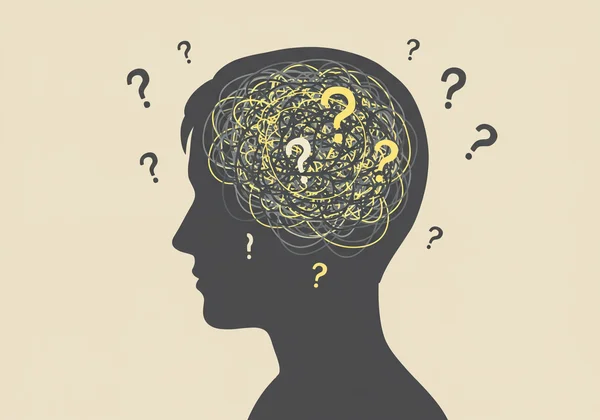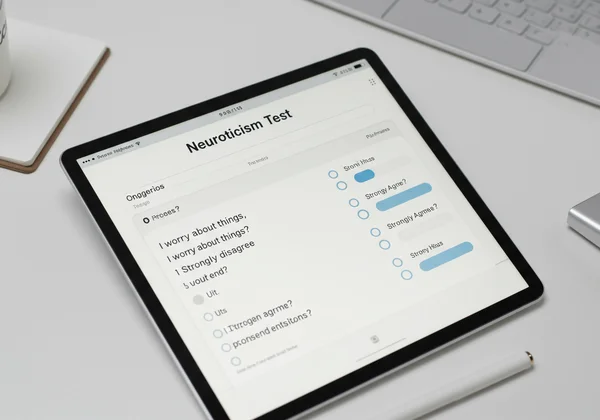The Ultimate Guide to the Neuroticism Test: Understanding Your Emotional Stability
August 17, 2025 | By Alicia Campos
Have you ever found yourself caught in a loop of worry, overthinking minor setbacks, or feeling emotionally overwhelmed by daily stressors? If so, you're not alone. Many of us grapple with these feelings, often wondering about the root of our emotional responses. This leads to a crucial question: How do I know if I have neuroticism? Taking a Neuroticism Test is the first, most empowering step toward understanding the unique landscape of your emotional world. It’s a journey of self-discovery, not of judgment. If you're ready to gain clarity on your emotional patterns, you can discover your score and begin to understand yourself on a deeper level.
This guide will walk you through everything you need to know about neuroticism, how it's measured, and how understanding your score can be a catalyst for profound personal growth.
What Exactly is Neuroticism? A Big Five Neuroticism Test Perspective
Before we dive into the test itself, let's clarify what neuroticism is—and what it isn't. In psychology, neuroticism is one of the "Big Five" personality traits, a widely accepted framework for understanding human personality. It's not a disorder or a flaw; it's a fundamental dimension of your personality that exists on a spectrum. Think of it as your innate sensitivity to negative emotions like anxiety, anger, self-doubt, and sadness.
A Big Five Neuroticism Test measures where you fall on this spectrum. Everyone has some level of neuroticism.
- High Neuroticism: Individuals with higher scores tend to experience more emotional volatility. They may be more prone to worry, perceive neutral situations as threatening, and find it harder to bounce back from stress. This heightened emotional reactivity can feel challenging, but it often comes with a silver lining: a deep sense of empathy, strong risk awareness, and a thoughtful, prepared approach to life.
- Low Neuroticism (High Emotional Stability): Those on the lower end of the spectrum are generally more emotionally stable and resilient. They tend to remain calm under pressure, worry less, and maintain a more even-keeled emotional state. They are often seen as secure and self-confident.
Understanding your placement on this spectrum is key. It provides a framework for interpreting your reactions and behaviors without self-criticism.

Signs and Behaviors: Are You a High Neuroticism Test Candidate?
Wondering if your emotional tendencies lean towards the higher end of the neuroticism scale? While only a structured assessment can give you a clear picture, certain patterns are commonly associated with this trait. Recognizing them is the first step toward greater self-awareness. People who might score higher on a high neuroticism test often report experiencing the following.
Do any of these sound familiar?
- Frequent Worrying: You often find your mind racing with "what if" scenarios, even about small things.
- Proneness to Anxiety: A persistent feeling of unease or nervousness is a frequent companion. You might find our online personality test for anxiety insightful.
- Mood Swings: Your emotions can shift quickly, sometimes without a clear external trigger.
- High Self-Consciousness: You may worry excessively about what others think of you, leading to feelings of embarrassment or awkwardness.
- Difficulty with Stress: You feel easily overwhelmed by stressful situations and may take longer to recover from setbacks.
- Tendency Towards Sadness: You might be more susceptible to feelings of melancholy, disappointment, or loneliness.
If you recognize yourself in these descriptions, it's simply an indication of your unique emotional makeup. It's not a verdict on your character. Instead, it’s valuable information that can help you navigate life more effectively. The best way to confirm these tendencies is to take the test and get objective feedback.

Why Take a Neuroticism Test Online? The Path to Self-Awareness
Why invest time in a neuroticism test online? Because it provides a structured, private, and accessible way to move from vague feelings to concrete insights—the starting point for real personal growth.
Taking a reliable neuroticism assessment offers several key benefits:
- Objective Insight: It provides an unbiased measure of your emotional tendencies, free from the subjective lens of your own mood or recent experiences.
- Pattern Recognition: Seeing your score can help you connect the dots between your personality trait and your real-world behaviors in relationships, work, and personal life.
- Validation and Normalization: Understanding that neuroticism is a common personality trait can be incredibly validating. It helps you realize you're not "broken" but simply wired a certain way.
- A Foundation for Growth: You can't change what you don't acknowledge. Your score serves as a baseline, empowering you to seek out strategies for stress management and emotional regulation that are tailored to you.
How Our Free Neuroticism Test Works and What You'll Learn
We believe that self-knowledge should be accessible to everyone. That's why we offer a free neuroticism test designed to give you quick, reliable, and meaningful insights. Our process is simple, user-friendly, and built on established psychological principles.
Here’s what you can expect when you decide to get your analysis:
- Answer 20 Simple Questions: The test consists of 20 straightforward questions about your typical emotional reactions and behaviors. Answer honestly for the most accurate results.
- Receive Your Instant Score: As soon as you finish, you’ll see your neuroticism score and a basic interpretation. This gives you an immediate understanding of where you fall on the spectrum, from a low neuroticism score to a high one.
- Unlock Your AI-Powered Deep Dive (Optional): For those seeking deeper personality insights, we offer an optional, comprehensive report generated by AI. This premium analysis goes far beyond a simple score. It provides:
- Personalized Scenarios: See how your neuroticism level might play out in specific work and life situations.
- Strengths & Challenges: Understand both the potential advantages (like preparedness) and the difficulties associated with your score.
- Actionable Growth Plan: Receive practical, customized advice for managing your emotional responses and building resilience.
This two-tiered approach ensures you can get a quick snapshot for free or invest in a detailed roadmap for your personal development journey.

Frequently Asked Questions
Here are answers to some common questions about neuroticism and our test.
What does a high neuroticism score mean?
A high neuroticism score means you have a stronger tendency to experience negative emotions like anxiety, worry, and sadness in response to stressors. It is not a measure of your worth or capability. Instead, it highlights a part of your personality that may benefit from targeted coping strategies, such as mindfulness, cognitive reframing, and effective stress management techniques. Our AI-powered report provides specific suggestions to help you thrive.
Is neuroticism just anxiety?
While anxiety is a core component of neuroticism, they are not the same thing. Neuroticism is a broader personality trait that encompasses a range of negative emotional tendencies, including anxiety, but also anger, frustration, jealousy, and depression. Think of neuroticism as the underlying sensitivity, while anxiety is one of the primary ways that sensitivity can manifest.
Can you fix or reduce neuroticism?
As a core personality trait, neuroticism is relatively stable over a lifetime. However, you can absolutely learn to manage its expression and reduce its negative impact on your life. You can't "fix" your personality, but you can build skills in emotional regulation. Through practices like cognitive-behavioral therapy (CBT), mindfulness, and developing healthier lifestyle habits, individuals can significantly improve their emotional stability and well-being. Our online tool is a great first step in identifying areas for growth.
Your Journey to Emotional Clarity Starts Now
Understanding your personality is one of the most powerful gifts you can give yourself. It replaces confusion with clarity, self-criticism with self-compassion, and reactivity with intention. A Neuroticism Test is more than just a quiz; it’s a mirror that reflects your inner emotional workings, offering you the chance to understand, accept, and grow.
Whether you're a self-explorer curious about your mind, a professional looking to manage stress, or a student of psychology, this tool provides a valuable foundation. It’s a science-backed, private, and empowering way to know yourself better.
Are you ready to take the first step? Discover your unique emotional profile and unlock actionable insights for a more balanced life. Start your journey now and see what you can learn.